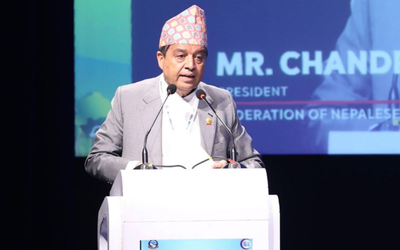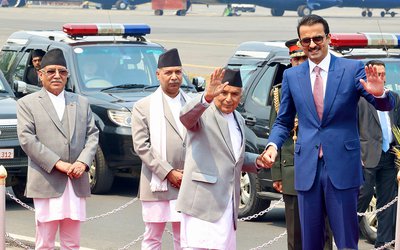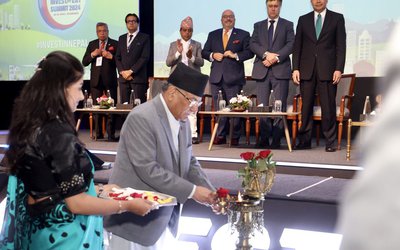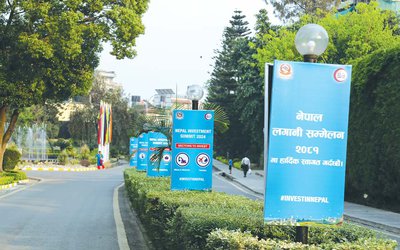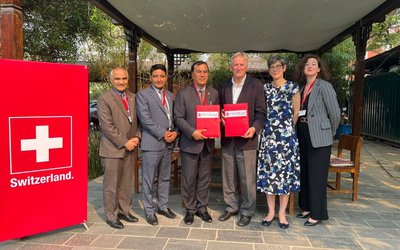Current government formed after the controversial seven-point deal signed between the chairpersons of UML and UCPN Maoist is still in an infant stage in that even after two months of its declaration pm Khanal is still struggling to get new members in from different parties including the one of which he is the chairperson. Nepali Congress (NC) expressing deep reservations on the two clauses related to the integration of Maoist combatants and heading the government by turn, has demanded scrapping of the deal. On this front of struggle, NC is joined by a numberof party including a strong fraction of UML led by Nepal and Oli.NC is currently flooded with issues that it needs to agitate on as the controversies of one kind or the other have fully inundated the current dispensation. Of the numerous controversies created by the government in such a short period of time, the government idea about a supplementary budget for the remaining few months of the current fiscal has not only surprised but created serious doubts in the minds of observers about the intention of the authorities at a time when capital expenditure has taken a nose dive, revenue collection is likely to meet the annual target of Rs 216 billion and the government has more than Rs. 20billion parked with the central bank.Further,nobody is prepared to believe that the supplementary budget will contribute towards taming high level of inflation, double digit since last 34 months, narrowing the trade deficit standing at record 27 percent of gdp and correcting the persistently negative balance of payment. Since the government has failed to provide answer to these queries raised from different quarters, opposition to this proposal of government is mounting not only from parties in opposition but from within UML itself.Rumours circulating in Kathmandu suggest that Maoists experts are working on the budget for the next three months, ignoring the concerned officials in the line ministry.DPM and in charge of finance and energy ministry read out in the legislative parliament a policy document on energy that, in addition to declaration of energy emergency, came up with an ambitious plan of four-and-a-half-year to deal with related woes. This plan talks about harnessing solar energy, installation immediately of thermal plants to reduce power outage hours and encouraging swift implementation of hydro power projects through provision of funds from financial institution, subsidy and tax rebate.DPM Adhikari also told the house that he would soon place a bill on the related issues. People and parliamentarians were encouraged to learn about the energy document that appeared to have been written with inputs from line agencies and we had no reason not to believe that this would be different from previous declaration of energy crisis by then prime minister Prachand who had also promised to go for massive installation of thermal plants to solve power problems. This declaration of Prachand thrown for public consumption without proper homework and consultations met with vehement opposition from UML, then coalition partner under whose jurisdiction fell then water resources ministry. Analysts were in no mood to draw any line of analogy between then and now until it was reported by the press that the policy document was prepared in the ministry of finance completely ignoring the energy ministry.Further, Nepal Electricity officials and unionists expressed their serious reservations about some of the provisions contained in the policy document. The idea of powering Singh Durbar by solar energy has become controversial, too. The infant government is dragged into controversy on this front, too. Finance secretary Rameshwor Khanal’s resignation has pushed this seven-member government into the most serious controversy as Khanal,a man of integrity and professional skill, is believed to have major differences with minister Adhikari on the supplementary budget, action on tax(vat) evaders, massive transfer of ministry officials and over the appointment in the proposed energy commission. Gathering from whatever little is heard from Khanal from distant corners of Nepal, one is tempted to conclude that his resignation at this point of time was not planned since long, despite his insistence. It is now crystal clear that he was feeling bitter about the way budget work was carried out by people that had hardly anything to do with the ministry.Further, Khanal was also unhappy, it is gathered, about Adhikari’s reluctance to take tough action against fake vat receipt racketeers some of which are said to be resourceful enough to influence the decision of the government. This reported involvement of big business houses in the racket has further fertilized the suspicion of those who want to believe that the government was thinking of providing relief to the evaders through supplementary budget.Otherwise,where is the need for a new budget when we are already into the ninth month of the current fiscal.Khanal’s resignation would not have received this kind of prominence and publicity had it been tendered in normal times when issues of national importance had not engulfed a government. Can we, therefore, blame him for what the main opposition party is doing in the parliament and what we are writing and speaking on the controversy? Why should one not believe that he resigned after PM Khanal and other stalwarts of UML jointly accused him of noncooperation?
Everybody with some sense fully understands that the current government led by UML party has come into existence as a result of cooperation provided by the number one party (Maoist) in the country following the controversial deal signed between the two parties. It should also be understood that people want the Maoists to see that the government works responsibly without indulging in serious controversies. It is understood that Maoists had serious reservations about this year’s budget, which forced them into using muscle to prevent it from being read in the parliament. They should, however, not fail to understand that a supplementary budget for three months cannot be a good substitute of the full fledged budget at this point of time. They should concentrate on the budget for the next fiscal and try to bring it little earlier, unlike the delays last three years, so that capital expenditure also increases reasonably to induce economic activities. We are one of the most corrupt and poorest nations in the world.
(Dr. Rawal is a CA member and a former Governor of the central bank)
- QATAR AMIR’S STATE VISIT: Five Agreements
- Apr 28, 2024
- TANAHU HYDROPOWER PROEJCT: A Significant Achievement
- Apr 15, 2024
- AMBASSADOR HANAN GODAR: Sharing Pain With A Nepali Family
- Mar 30, 2024
- VISIT OF KfW AND EIB TO NEPAL : Mission Matters
- Mar 25, 2024
- NEPAL BRITAIN SOCIETY: Pratima Pande's Leadership
- Mar 24, 2024







